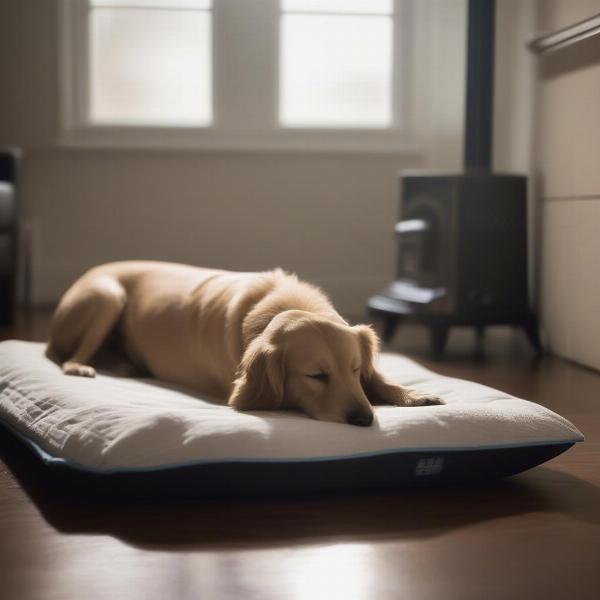Excessive panting in dogs at night can be alarming for owners. Is it normal? Should you be worried? This article will explore the various reasons why your dog might be panting heavily at night, ranging from simple explanations to more serious medical conditions, and offer guidance on when to seek veterinary attention.
Common Reasons for Nighttime Panting in Dogs
There are several reasons why your dog might be panting more at night. Some are perfectly normal, while others warrant further investigation.
-
Temperature: Dogs don’t sweat like humans; they pant to regulate their body temperature. If your home is too warm, especially at night, your dog might pant excessively to cool down. Make sure the room is well-ventilated and consider using a fan or air conditioning. Provide plenty of fresh, cool water.
-
Anxiety or Stress: Just like us, dogs can experience anxiety and stress. Separation anxiety, loud noises, or changes in routine can trigger panting, especially at night when things are quieter and they’re more likely to focus on their anxieties. A calming environment, a comfortable bed, and perhaps a calming aid recommended by your vet can help.
-
Pain or Discomfort: Panting can be a sign of pain or discomfort. If your dog has arthritis, an injury, or another medical condition, the pain might be more pronounced at night, leading to increased panting. Observe your dog for other signs of pain, such as limping, whining, or changes in appetite.
-
Obesity: Overweight dogs tend to pant more, even at rest, because the extra weight puts a strain on their respiratory and cardiovascular systems. Maintaining a healthy weight through proper diet and exercise is crucial for your dog’s overall well-being.
-
Medication Side Effects: Certain medications can cause increased panting as a side effect. If your dog recently started a new medication, consult your veterinarian to see if panting is a listed side effect.
When to Worry: Serious Medical Concerns
While many causes of nighttime panting are benign, some can indicate serious medical problems requiring immediate veterinary attention:
- Respiratory Issues: Conditions like pneumonia, asthma, or lung tumors can cause difficulty breathing, leading to excessive panting.
- Heart Problems: Heart disease can make it harder for the heart to pump blood efficiently, resulting in panting, especially during periods of rest.
- Cushing’s Disease: This hormonal disorder can cause a variety of symptoms, including increased thirst, urination, and panting.
- Bloat: This life-threatening condition causes the stomach to fill with gas and twist, cutting off blood supply. Panting, restlessness, and a distended abdomen are all warning signs.
What to Do if Your Dog Pants Excessively at Night
If your dog’s panting is new, persistent, or accompanied by other symptoms, consult your veterinarian immediately. Early diagnosis and treatment are crucial for managing serious conditions.
What questions will the vet ask?
Your vet will likely ask about your dog’s age, breed, medical history, and any recent changes in behavior or environment. Be prepared to describe the panting – when it started, how often it occurs, and any accompanying symptoms.
Preventing Nighttime Panting
- Maintain a comfortable temperature: Ensure your dog’s sleeping area is cool and well-ventilated.
- Reduce stress and anxiety: Create a calm and predictable environment, especially at night.
- Provide regular exercise: Daily exercise helps maintain a healthy weight and reduces stress.
- Offer fresh water: Always ensure your dog has access to fresh, cool water.
 Dog sleeping comfortably in a cool room
Dog sleeping comfortably in a cool room
Conclusion
While occasional panting at night can be normal, persistent or severe panting warrants attention. By understanding the potential causes and taking appropriate action, you can help ensure your furry friend’s health and well-being. If in doubt, always consult your veterinarian.
FAQ
- Is it normal for dogs to pant a little at night? Some panting can be normal, especially if the environment is warm. However, excessive or persistent panting should be investigated.
- What are the signs of heatstroke in dogs? Excessive panting, drooling, weakness, vomiting, and collapse are all signs of heatstroke. Seek immediate veterinary attention if you suspect your dog is experiencing heatstroke.
- Can anxiety cause a dog to pant at night? Yes, anxiety can lead to increased panting, especially at night when dogs are more sensitive to stressors.
- How can I make my dog more comfortable at night? Ensure a cool, quiet sleeping area, a comfortable bed, and access to fresh water.
- When should I take my dog to the vet for panting? If the panting is new, persistent, severe, or accompanied by other symptoms, contact your vet immediately.
- What if my dog is panting and shaking at night? Panting and shaking can indicate pain, anxiety, or a medical condition. Consult your vet.
- Could my dog’s diet be causing nighttime panting? While unlikely, certain food allergies or sensitivities could contribute to discomfort and panting. Discuss your dog’s diet with your vet.
ILM Dog is your trusted source for expert advice on all aspects of dog care, from breed selection to health and behavior. We offer a wealth of information to help you provide the best possible care for your canine companion. For expert guidance tailored to your dog’s unique needs, contact us at [email protected] or call us at +44 20-3965-8624. ILM Dog is dedicated to helping you navigate the joys and challenges of dog ownership, ensuring a happy and healthy life for your beloved pet.